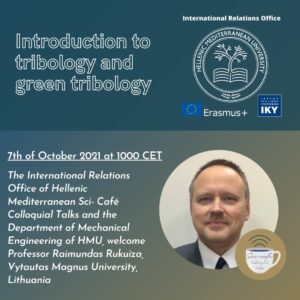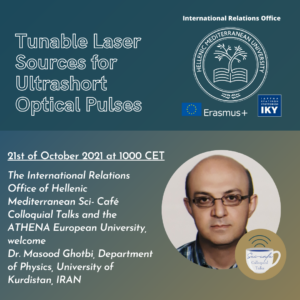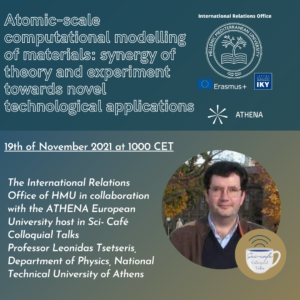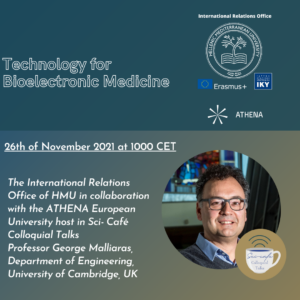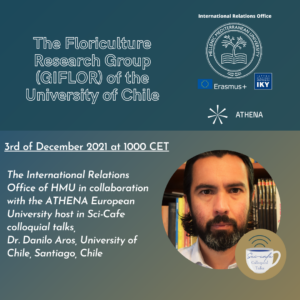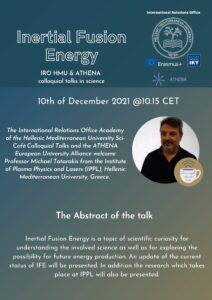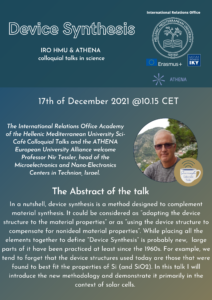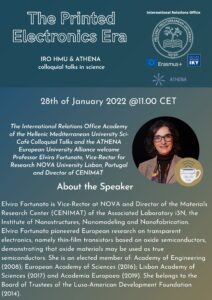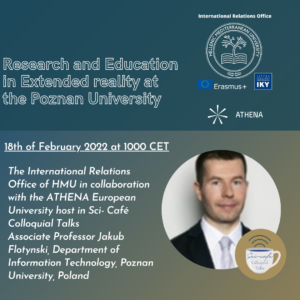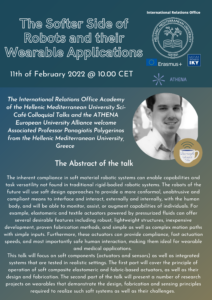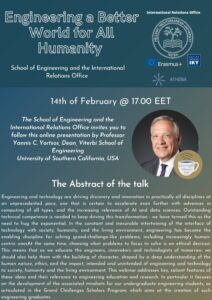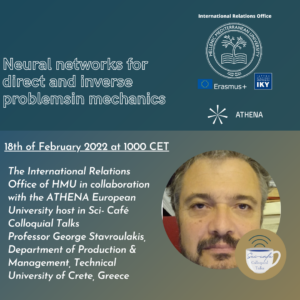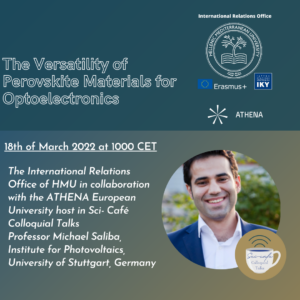Welcome to the Sci-Cafe initiative hosted by the International Relations Office of the Hellenic Mediterranean University in collaboration with the HMU Departments & Schools and the ATHENA European University initiative ‘Discover the Potential’. The main objectives of the Sci-cafe are the following:
- Aware of our partners in Greece and in the rest of the World of the research takes place at Hellenic Mediterranean University
- To aware HMU ecosystem of research work happens in all fields beyond its borders
- Build the osmosis of collaboration between HMU researchers and researchers all over the world
- The speakers to operate as mentors & influencers to our students
- To Internationalize our training programs and research
All the talks happen on Fridays (two talks have been planned per month – unless we have more volunteers) at 10.00 CET using the zoom platform. In order to join us and receive the zoom link please register yourself at the following link: https://forms.gle/bgUkLkMYqjwbMPG9A
We hope that you will join us
October Talks
Date: 7th of October 2021
Title: Introduction to tribology and green tribology
Moderator: Professor Achilleas Vairis, Department of Mechanical Engineering, Hellenic Mediterranean University, Greece
About the Speaker
Raimundas Rukuiza is Professor at the Vytautas Magnus University in Lithuania
YouTube Video: https://youtu.be/T1K3FWUckdM
Date: 22nd of October 2021
Title: Tunable Laser Sources for Ultrashort Laser Pulses Generation
Moderator: Associate Professor Konstantinos Petridis, International Relations Office & Department of Electronic Engineering, Hellenic Mediterranean University, Greece
About the Speaker
Masood Ghotbi received his Ph. D. degree in physics from the Amirkabir University of Technology, Tehran, Iran, in 2006. After a two-year postdoctoral stay at the Institute of Photonics Sciences (ICFO), Barcelona, Spain, he joined the Max-Born-Institute for Nonlinear and Ultrafast Spectroscopy (MBI), Berlin, Germany in 2007 till 2012 when he was employed as a faculty member of the Physics department in the University of Kurdistan, Iran. His research interests include nonlinear optics, laser physics, and ultrashort pulses. His current research program is focused on the generation and applications of tunable ultrashort pulses in different spectral areas
YouTube Video: https://youtu.be/agYLfv6spyE
November’s Talks
Date: 19th of November 2021
Title: Atomic-scale computational modeling of materials: synergy of theory and experiment towards novel technological applications
Abstract:
Materials modeling at the atomic scale is well established as an indispensable tool to explain available experimental data, but also opens new directions in research by proposing novel materials and phenomena. Perhaps the most popular method for the quantum-mechanical atomistic study of materials is the so-called Density Functional Theory (DFT) approach, which is an effective and robust way to deal with the challenging many-body problem of interacting electrons. This talk will first give a brief introduction to the basic concepts and technicalities of DFT and then highlight representative cases of joint experimental and DFT-based computational work on the design and optimization of state-of-the-art devices in diverse fields of technology. Examples include work on solar cells with outstanding photo-conversion efficiencies and on transistors with high carrier mobilities and operational stability. We will conclude with the recently achieved laser-induced transfer of two-dimensional materials, such as graphene, a new paradigm for printing even atomically-thin systems with high quality and well-defined patterns.
Moderator: Professor George Kavoulakis, Department of Mechanical Engineering, Hellenic Mediterranean University, Greece
About the Speaker
Leonidas Tsetseris is a Professor in the Department of Physics of the National Technical University of Athens, Greece. Leonidas Tsetseris obtained a Bachelor’s degree in Physics from the Aristotle University of Thessaloniki, a Master’s degree, and a Ph.D. from the Department of Physics of the University of Illinois at Urbana-Champaign (USA). Thesis title: “Analytical Green function studies of interlayer exchange coupling in magnetic multilayers” (advisor: Prof. Yia-Chung Chang ). After working as a Research Associate and Research Assistant Professor at the Max-Planck Institute for Solid State Physics (Stuttgart, Germany) and Vanderbilt University (Nashville, USA), he joined the Faculty of the Department of Physics, School of Applied Mathematical and Physical Sciences at the National Technical University of Athens, where he currently serves as Professor. His field of expertise is Theoretical and Computational Condensed Matter Physics and Materials Science. Together with his collaborators over the years, he has used computational tools to probe the properties of different types of materials, such as established and emerging electronic materials, organic semiconductors, two-dimensional materials, halide perovskites, and other materials used as active or carrier transport layers in optoelectronic devices. Leonida’s research has received more than 3300 citations and his h-index according to the Scopus is 36. More about Professor Tsetseris can be found here
YouTube Video: https://youtu.be/UvLarmncnn8
Date: 26th of November 2021
Title: Technology for Bioelectronic Medicine
Abstract:
Bioelectronic medicine provides a new means of addressing disease via the electrical stimulation of tissues: Deep brain stimulation, for example, has shown exceptional promise in the treatment of neurological and neuropsychiatric disorders, while stimulation of peripheral nerves is being explored to treat autoimmune disorders. To bring these technologies to patients at scale, however, significant challenges remain to be addressed. Key among these is our ability to establish stable and efficient interfaces between electronics and the human body. I will show examples of how this can be achieved using new electronic materials and devices engineered to communicate with the body and evolve with it.
Moderator: Associate Professor Konstantinos Petridis, International Relations Office & Department of Electronic Engineering, Hellenic Mediterranean University, Greece
About the Speaker
George Malliaras is a Prince Philip Professor of Technology at the University of Cambridge, UK. George holds a Ph.D. in Mathematics and Physical Sciences, cum laude, from the University of Groningen (the Netherlands) in 1995. George’s research has received more than 26700 citations and his h-index according to the Scopus is 90. More info about Professor Malliaras can be found here
YouTube Video: https://youtu.be/SjntOQhOMrk
December’s Talks
Date: 3rd of December 2021
Title: The Floriculture Research Group of the University of Chile
Abstract:
Chile presents rich biodiversity of vascular plants with almost 5,000 native species, being about 50% of them endemic. Many of these species show an attractive ornamental value, therefore the Floriculture Research Group (GIFLOR) of the University of Chile has been focused on the propagation, characterization, and breeding of some of these species, particularly in genera such as Alstroemeria and Pasithea (geophytes); and Junellia, Malesherbia, Salpiglossis and Schizanthus (herbaceous perennials). In vitro and ex Vitro studies, using different explants and media, have been conducted to achieve an efficient method of propagation. Flower color and scent have been analyzed using different methodologies, including phenotyping (color chart, color meter, morphology), sensorial (trained and non-trained panel), chemical (HP-LC, GC-MS), and molecular (gene expression, molecular markers). Promissory species and genetic lines of Alstroemeria have been bred using interspecific hybridization by embryo rescue. At the moment, some of these hybrids are being evaluated to validate their performance as new varieties for the ornamental plant market.
Moderator: Professor Nektarios Panagiotis, Dean of the Agriculture School, Hellenic Mediterranean University, Greece
About the Speaker
Dr. Danilo Aros is an Associate Professor at the Faculty of Agricultural Sciences of the University of Chile (Santiago, Chile) since 2018. He finished his undergraduate studies in Agricultural Sciences at the same University in 2005 and then he obtained a Ph.D. in Molecular Cell Biology at the School of Biosciences, Cardiff University (Cardiff, Wales). His research is focused on Plant Biotechnology and Breeding, with an emphasis on ornamental plants. The main aim of his research is to study the propagation, characterization, and breeding of native plants with ornamental value. This research has been supported by studies on in vitro propagation; morphological, molecular, sensorial, and chemical characterization (focused on flower color and scent); and application of breeding techniques including mutagenesis and interspecific hybridization by embryo rescue.
CV / University of Chile: https://www.uchile.cl/portafolio-academico/impresion.jsf?username=daros
Website: https://www.floricultura.uchile.cl/
YouTube Video: https://www.youtube.com/watch?v=lJpzwTGfPvU&list=PL3OWQw2onmC_fjutflKRDT0OVw_1z0XFW&index=34
Date: 10th of December 2021
Title: Developments in Laser Inertial Fusion Energy
Abstract:
Inertial Fusion Energy is a topic of scientific curiosity for understanding the involved science as well as for exploring the possibility for future energy production. An update of the current status of IFE will be presented. In addition, the research which takes place at the Institute of Plasma Physics and Lasers (IPPL) will also be presented.
Moderator: Associate Professor Konstantinos Petridis, International Relations Office & Department of Electronic Engineering, Hellenic Mediterranean University, Greece
About the Speaker
Michael Tatarakis is a Professor in the Department of Electronic Engineering at Hellenic Mediterranean University and also the director of the Institute of Plasma Physics and Lasers (IPPL) at Hellenic Mediterranean University. Michael holds a Ph.D. in Physics, from Imperial College London in 1997. Michael’s research has received more than 7000 citations and his h-index according to the Scopus is 41. More info about Professor Tatarakis can be found here
YouTube Video: https://youtu.be/6BwiU1a61vg
Date: 17th of December 2021
Title: Device Synthesis
Abstract:
In a nutshell, device synthesis is a method designed to complement material synthesis. It could be considered as “adapting the device structure to the material properties” or as “using the device structure to compensate for nonideal material properties”. While placing all the elements together to define “Device Synthesis” is probably new, large parts of it have been practiced at least since the 1960s. For example, we tend to forget that the device structures used today are those that were found to best fit the properties of Si (and SiO2). In this talk, I will introduce the new methodology and demonstrate it primarily in the context of solar cells. If you have already watched the OMD YouTube channel, I am going to present a different perspective and the chem-Phys examples are different (i.e., you won’t be bored).
Moderator: Associate Professor Konstantinos Petridis, International Relations Office & Department of Electronic Engineering, Hellenic Mediterranean University, Greece
About the Speaker
Nir Tessler has been working on Device Physics since starting his Ph.D. (1991) and on Device Chemical-Physics since starting his Post Doc (11/1995). In his Ph.D., he was the first to provide a comprehensive picture of multiple quantum well InP/InGaAs lasers showing that the QWs structure and layout were limiting the modulation speed and thus the communication rate. Six months into his post-doc, at the Cavendish, he demonstrated the world’s first organic semiconductor laser which provided the general community the first direct proof that organics (or PPV at the time) are high-quality semiconductors. In 2002, his group at the Technion was the first to demonstrate and model the charge density and film morphology (or MW) dependence of the charge transport in organic polymers. Over the years his group has been involved with a better understanding of transistors, solar cells, and photodiodes. Some of the by-products were the invention of the perforated source vertical field-effect transistor and solar cell structures for improved device efficiency. His current interests are more towards the electrochemical side of the device operation including mixed ionic electronic transport and reactions, some of which can be found in perovskite solar cells. Nir Tessler currently serves as the head of the Microelectronics and Nano-Electronics centers at the Technion. Nir’s research has received more than 12800 citations and his h-index according to the Scopus is 47. More info about Professor Tessler can be found here
YouTube Video: https://youtu.be/Np63phyhZMg
January’s Talks
Date: 21st of January 2022
Title: Transparent Electronics
Abstract:
TBA
Moderator: Konstantinos Petridis
About the Speaker
Elvira Fortunato is Vice-Rector at NOVA and Director of the Materials Research Center (CENIMAT) of the Associated Laboratory i3N, the Institute of Nanostructures, Nanomodeling, and Nanofabrication. Elvira Fortunato pioneered European research on transparent electronics, namely thin-film transistors based on oxide semiconductors, demonstrating that oxide materials may be used as true semiconductors. She is co-inventor of the paper electronics concept worldwide: Paper-e®. In 2008 she wins an Advanced Grant from the European Research Council (ERC) for the project “Invisible” and in 2018 she received the second one ERC, with the amount of € 3.5 million. The project is entitled “Multifunctional Digital Materials Platform for Smart Integrated Applications | DIGISMART”.
Her research team is exploring novel active properties in advanced and sustainable multifunctional materials, including oxides as well as novel electronic-active materials including alternative deposition methods, with the main objective of developing eco-friendly technologies and devices to be used and exploited in electronic circuits made of stable amorphous semiconductors able to serve large area smart flexible and conformable surface electronics.
She is an elected member of Academy of Engineering (2008); the European Academy of Sciences (2016); the Lisbon Academy of Sciences (2017) and Academia Europaea (2019). She belongs to the Board of Trustees of the Luso-American Development Foundation (2014).
The most recent awards are: In September 2020, received the European Commission’s Horizon Impact Award 2020, Winner of the 2020 Pessoa Award (March 2021), The World Federation of Engineering Organizations (WFEO) GREE Women in Engineering Award 2020 (08th April 2021), Gold Medal Human Rights 2020 Award recognition granted by the President of the Assembly of the Republic of Portugal (07th July 2021).
Former Chief Scientific Advisor of the European Commission, between 2016 and 2020. She is coordinating since 2019 at NOVA University the SPEAR project, a European platform for supporting and implementing plans for gender equality in academia and research.
YouTube Video: https://www.youtube.com/watch?v=WagmfoObxbM&list=PL3OWQw2onmC_fjutflKRDT0OVw_1z0XFW&index=37
Date: 28th of January 2022
Title: Research and Education in Extended Reality at the Poznań University of Economics and Business
Abstract:
The Poznań University Of Economics and Business (PUEB) is one of the oldest, most prestigious schools of economics in Poland. Since 1926, we have been continually developing higher education and ensuring high quality of scientific studies and constant development of research infrastructure. We prepare numerous economic expert reports and implement innovative projects. High-quality education, which we have provided for years, allows our students and graduates to successfully face the challenges of a dynamic labor market.
For over 20 years, research in the field of extended reality, encompassing virtual and augmented reality, is being performed in the Department of Information Technology of PUEB. The department possesses the Virtual Reality Laboratory (VR Lab), which is one of the newest and well-equipped laboratories of PUEB. The VR Lab is equipped with hardware and software allowing high-quality acquisition of 3D models (by scanning physical objects and their motion), advanced user interaction (with body movements, gestures, and touch), and presentation of virtual environments with a variety of Head-Mounted Displays (HMD), interactive Powerwall system and CAVE (Cave Automatic Virtual Environment). Our application fields include e-commerce, marketing, cultural heritage, education, and rapid prototyping of products. In all these fields the use of VR/AR techniques opens new, unprecedented opportunities.
Moderator: Professor Athanasios Malamos, Department of Electrical and Computer Engineering, Hellenic Mediterranean University, Greece
About the Speaker
Jakub Flotyński is an Associate Professor in the Department of Information Technology at the Poznań University of Economics and Business, Poland. His research interests are focused on the intersection of virtual, augmented, and extended reality (XR) and knowledge representation technologies, including the semantic web, description logics, and logic programming. He is the author or co-author of 55 research papers and has participated in multiple research and industrial projects in these fields. He is also a Co-Chair of the X3D Semantic Web Working Group in the Web3D Consortium, which contributes to the development of principal solutions in the field of semantic knowledge-based XR systems and 3D content formats.
YouTube Video: TBA
February’s Talks
Date: 11th of February 2022
Title: “The Softer Side of Robots and their Wearable Applications”
Abstract:
The inherent compliance in soft material robotic systems can enable capabilities and task versatility not found in traditional rigid-bodied robotic systems. The robots of the future will use soft design approaches to provide a more conformal, unobtrusive, and compliant means to interface and interact, externally and internally, with the human body, and will be able to monitor, assist, or augment the capabilities of individuals. For example, elastomeric and textile actuators powered by pressurized fluids can offer several desirable features including robust, lightweight structures, inexpensive development, proven fabrication methods, and simple as well as complex motion paths with simple inputs. Furthermore, these actuators can provide compliance, fast actuation speeds, and most importantly safe human interaction, making them ideal for wearable and medical applications.
This talk will focus on soft components (actuators and sensors) as well as integrated systems that are tested in realistic settings. The first part will cover the principle of operation of soft composite elastomeric and fabric-based actuators, as well as their design and fabrication. The second part of the talk will present a number of research projects on wearables that demonstrate the design, fabrication, and sensing principles required to realize such soft systems as well as their challenges.
Moderator: Associate Professor Konstantinos Petridis, International Relations Office & Department of Electronic Engineering, Hellenic Mediterranean University, Greece
About the Speaker
Panagiotis (Panos) Polygerinos received in 2006 a BSc degree in Mechanical Engineering from the Technological Educational Institute of Crete, Greece in 2006 (top of his class) and in 2007 a MSc degree in Mechatronics (with distinction), from King’s College London, London, U.K. A few years later, in 2011, and as a scholar of both the Engineering and Physical Sciences Research Council (EPSRC) and the Onassis Foundation, he obtained a Ph.D. in Mechanical Engineering (Robotics), again from King’s College London, under the supervision of Prof. K. Althoefer. In 2012, he joined as a postdoctoral fellow at the John A. Paulson School of Engineering and Physical Sciences at Harvard University, MA, USA. He was soon after elected as a Wyss Postdoctoral Fellow in Technology Development of the Wyss Institute for Biologically Inspired Engineering at Harvard University and worked on several novel robotics research projects under the supervision of Prof. C. Walsh. In 2015, he was appointed a tenure-track assistant professor at the Ira A. Fulton Schools of Engineering at Arizona State University, AZ, USA, where he founded and directed the Bio-inspired Mechatronics laboratory and mentored several Ph.D., MSc, and BSc students. As an academic, he successfully established an independent research portfolio and attracted federal/state research grants and support from companies totaling over $2.0M within the first few years.
After 10+ years of conducting research in the UK and USA, in 2019 returned to Greece and joined Ernst & Young’s (EY) Strategy group as a senior consultant to aid the digital/technological transformation of Greek industries. A year later, in 2020, moved to BIC and the first Data-Driven Innovation Lab to help develop inventive new products using ML and NLP research methods.
In 2021 was appointed as a tenured associate professor of soft robotics and mechatronics at the Hellenic Mediterranean University in Crete. He focuses on leading innovative research and development projects and has demonstrated a track record with over 50 published scientific papers in peer-reviewed journals and conferences related to robotics, as well as, several awarded and pending patent applications. Thus far, his research endeavors have been received enthusiastically by the academic community attracting best paper awards at international conferences (IEEE ICCOR 2015), front cover illustrations at major journals (Science Translational Medicine, Advanced Functional Materials), and has an h-index of 25 with over 6000 citations. He is a senior member of the IEEE and acts as an associate editor for major robotics journals and conferences.
YouTube Video: https://youtu.be/XD48ffuftNQ
Date: 14th of February 2022
Title: Engineering a Better World for All Humanity
Abstract:
Engineering and technology are driving discovery and innovation in practically all disciplines at an unprecedented pace, one that is certain to accelerate even further with advances in computing of all types, and the increasing relevance of AI and data sciences. Outstanding technical competence is needed to keep driving this transformation – we have termed this as the need to hug the exponential. In the constant and inexorable intertwining of the interface of technology with society, humanity, and the living environment, engineering has become the enabling discipline for solving grand-challenge-like problems, including increasingly human-centric ones. This engineering + mindset is permeating a vast variety of disciplines and areas, creating particularly fertile grounds for collaboration and innovation across the sciences, the professions, and the arts.
At the same time, choosing what problems to focus to solve is an ethical decision. This means that as we educate the engineers, innovators, and technologists of tomorrow, we should also help them with the building of character, shaped by a deep understanding of the human nature, ethics, and the impact, intended and unintended of engineering and technology to society, humanity and the living environment. In all these endeavors, with deep technological and human dimensions, we need to constantly re-invent, innovate and lead. Together, competence and character spell trust, and the creation of trustworthy engineers, more urgently needed today than ever before.
This webinar addresses key, salient features of these ideas and their relevance to engineering education and research. In particular, it focuses on the development of the associated mindsets for our undergraduate engineering students, as articulated in the Grand Challenges Scholars Program, which aims at the creation of such engineering graduates.
Moderator: This online talk is organized by the National Technical University of Athens, the Technical University of Crete, and all the Engineering Schools in Greece.
About the Speaker
Professor Yannis C. Yortsos is a Dean of the Viterbi School of Engineering at the University of Southern California, USA. He is a recipient of Bernard M. Gordon Prize 2022, of the National Academy of Engineering (NAE): “…For creating an innovative education program that prepares students to become future engineering leaders who will address the NAE Grand Challenges of Engineering”.
YouTube Video: You can attend live this talk following this link: https://www.youtube.com/channel/UC-L-24Fk5qakf_TxDadKH8g
Date: 18th of February 2022
Title: Neural networks for direct and inverse problems in mechanics
Abstract:
Machine learning methods, neural networks, and big data have attracted the interest of researchers in mechanics. The exploitation of experimentally or numerically generated data is one example where artificial neural networks can be trained in order to provide a reduced-order metamodel. A multi-layer feed-forward network, trained by the back-propagation method can be used in structural analysis problems for several inputs in order to predict the expected outputs. Depending on the input-output data, this approach can be used in order to study direct or inverse problems. A review of various applications will be given at the first part of the talk, including the early work for the study of crack and damage identification and recent results on spring-back prediction in metal stamp processing and on data-driven multiscale analysis of composite structures.
The availability of recent software and hardware and the developments in deep learning allow us to study more complicated problems. Training can be based on data generated by the governing relations without the necessity of having input-output data. The so-called physics-informed neural networks are promising tools suitable for real-time predictions. Recent research work and open questions for further research will be presented.
The talk will demonstrate that combined usage of computational mechanics and artificial intelligence tools is able to give solutions to hard classical tasks and provide novel approaches for the design of smart systems and reliable digital twins.
Moderator: Associate Professor Konstantinos Petridis, International Relations Office & Department of Electronic Engineering, Hellenic Mediterranean University, Greece
About the Speaker
George Stavroulakis is a Professor in the Department of Production Engineering and Management and Director of the Computational Mechanics & Optimization Laboratory (www.comeco.tuc.gr) at the Technical University of Crete, Greece. George holds a Ph.D. from the Department of Civil Engineer, Aristotle University of Thessaloniki, Greece, and a Habilitation degree from the Civil Engineering Department of the Technical University of Braunschweig (Germany). His work is focused on theoretical, computational study, applications, and software development in the areas of computational mechanics, nonsmooth mechanics, structural control and optimization, soft computing in mechanics, and structural analysis of monuments. George’s work has received more than 2100 citations and his h-index according to Scopus is 23. More info about Professor Stavroulakis can be found here
YouTube Video: TBA
Date: 25th of February 2022
Title: TBA
Abstract:
TBA
Moderator: Associate Professor Konstantinos Petridis, International Relations Office & Department of Electronic Engineering, Hellenic Mediterranean University, Greece
About the Speaker
Ellen Moons is a Professor of Physics (Material Physics) at Karlstad University in Sweden. Ellen holds a Ph.D. from Weizmann Institute of Science in Israel. Ellen’s work has received more than 6100 citations and her h-index according to Scopus is 32. More info about Professor Moons can be found here
YouTube Video: TBA
March Talks
Date: 11th of March 2022
Title:
Abstract:
Moderator: Associate Professor Konstantinos Petridis, International Relations Office & Department of Electronic Engineering, Hellenic Mediterranean University, Greece
About the Speaker:
Prof. Arben Mercoci is an ICREA Research Professor and leader of the ICN2 Nanobioelectronics and Biosensors Group, Arben Merkoçi obtained his PhD at the University of Tirana (Albania) in ion-selective electrodes. Since 1992 he has carried out research as a postdoctoral fellow and research professor at the Polytechnic University of Budapest (Hungary), University of Ioannina (Greece), Università Degli Studi di Padova (Italy), Universitat Politècnica de Catalunya, Universitat Autònoma de Barcelona, and New Mexico State University (USA). His research is focused on the integration of biological molecules and other species with micro- and nanostructures of interest in the design of novel (bio)sensors.
Prof. Merkoçi is Co-Editor in Chief of Biosensors and Bioelectronics, the principal international journal devoted to research, design development and application of biosensors and bioelectronics, member of editorial board of Electroanalysis, Microchimica Acta, and other journals.
Prof. Merkoçi has published 319 articles (H-index / citations: Google Scholar 84 / 23977; WOS 70 / 17682) and supervised 35 PhD theses. He is also involved in teaching PhD courses in the field of nanomaterial-based biosensors in several Spanish and international centers.
He has been a member of the commission for establishing the new Nanoscience and Nanotechnology undergraduate academic curriculum at the UAB, the first one in Spain, which started during the academic year 2010-2011. He is a member of the Academics Working Group of BIST and coordinator of the Nano diagnostics module of the Nanotechnology Master at the UAB. He has got several national and international grants related to nanomaterials application in biosensors and his group is collaborating with several worldwide leading labs in the field of nano-bio sensors.
Prof. Merkoçi serves also as a scientific evaluator and member of panels of experts of various international governmental and non-governmental agencies (EU-FP and EU-ERC panels and other panels in Europe, USA and other countries), as a scientific committee member of many international congresses, director of several workshops and other scientific events and have been invited to give plenary lectures, keynote and invited speeches in more than 200 occasions in various countries. Prof. Merkoçi is the co-founder of two spin-off companies: GraphenicaLab, devoted to graphene patterning, and PaperDrop, dedicated to clinical diagnostics.
Date: 18th of March 2022
Title: The Versatility of Perovskite Materials for Optoelectronics
Abstract:
Perovskite solar cells (PSCs) have created much excitement in the past years and attract spotlight attention. This talk will provide an overview of the reasons for this development highlighting the historic development as well as the specific material properties that make perovskites so attractive for the research community. The current challenges are exemplified using a high-performance model system for PSCs (multication Rb, Cs, methylammonium (MA), formamidinium (FA) perovskites). The triple cation (Cs, MA, FA) achieves high performance due to suppressed phase impurities. This results in more robust materials enabling breakthrough reproducibility.
Through multi-cation engineering, usually not-considered alkali metals, such as Rb, can be studied resulting in one of the highest voltages compared to the bandgap. Polymer-coated cells maintained 95% of their initial performance at elevated temperature for 500 hours under working conditions, a crucial step towards the industrialization of PSCs.
To explore the theme of multicomponent perovskites further, molecular cations were re-evaluated using a globularity factor. With this, we calculated that ethylammonium (EA) has been misclassified as too large. Using the multi-cation strategy, we studied an EA-containing compound that yielded a high open-circuit voltage of 1.59 V. Moreover, using EA, we demonstrate a continuous fine-tuning for perovskites in the “green gap” which is relevant for lasers and display technology. [6]
The last part elaborates on a roadmap on how to extend the multiplication to multicomponent engineering providing a series of new compounds that are highly relevant candidates for the coming years, also in areas beyond photovoltaics, for example for medical scintillation detectors.
Moderator: Associate Professor Konstantinos Petridis, International Relations Office & Department of Electronic Engineering, Hellenic Mediterranean University, Greece
About the Speaker
Michael Saliba is a Full Professor at the University of Stuttgart and the director of the Institute for Photovoltaics (ipv) at the University of Stuttgart. His research focuses on a deeper understanding and improvement of optoelectronic properties of photovoltaic materials with an emphasis on emerging perovskites for a sustainable energy future. Since 2021, Michael is the Speaker of the DFG Graduate School (GRK) 2642 for “Quantum Engineering”. Previously, Michael was at TU Darmstadt, Fribourg University and a Marie Curie Fellow at EPFL, Switzerland with a research stay at Cornell and Stanford hold a Ph.D. from the University of Oxford, the UK, in 2014. Michael’s work has received more than 24300 citations and his h-index according to Scopus is 59. More info about Professor Saliba can be found here
YouTube Video: TBA
April’s Talks
Date: 8th of April 2022
Title: TBA
Abstract:
TBA
Moderator: Associate Professor Konstantinos Petridis, International Relations Office & Department of Electronic Engineering, Hellenic Mediterranean University, Greece
About the Speaker
Guglielmo Lanzani is a Professor at the Physics department of Politecnico di Milano, Italy, and also the head of Center for Nano Science Technology @ POLIMI Istituto Italiano di Tecnologia. Guglielmo holds a Ph.D. in Chemical Physics, in 1992. Guglielmo’s work has received more than 12300 citations and his h-index according to Scopus is 54. More info about Professor Lanzani’s work can be found here
YouTube Video: TBA

